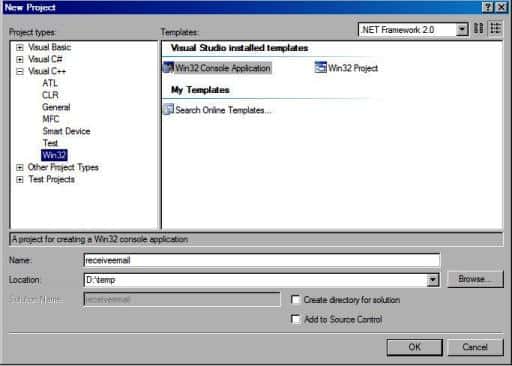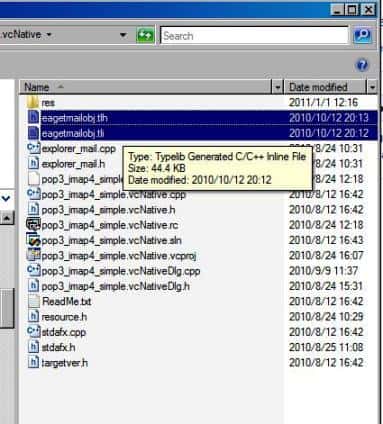Visual C++ - Retrieve email from IMAP4 server¶
The following c++ example codes demonstrate how to retrieve email from IMAP4 server. This sample downloads emails from IMAP4 server and deletes the email after the email is retrieved.
Sections:
Installation¶
Before you can use the following sample codes, you should download the EAGetMail Installer and install it on your machine at first. Full sample projects are included in this installer.
Add reference¶
To better demonstrate how to retrieve email and parse email, let’s create a Visual C++ console project named “receiveemail” at first, and then add the reference of EAGetMail in your project.

To use EAGetMail POP3 & IMAP4 ActiveX Object in your project, the first step is “Add header files of EAGetMail to your project”.
Please go to C:\Program Files\EAGetMail\Include\tlh
or C:\Program Files (x86)\EAGetMail\Include\tlh folder, find eagetmailobj.tlh and eagetmailobj.tli,
and then copy these files to your project folder. You can start to use it to retrieve email and parse email in your project.

Visual C++ - Retrieve email from IMAP4 server - example¶
The following example codes demonstrate retrieving email from IMAP4 server.
In order to run it correctly, please change email server, user, password, folder, file name value to yours.
Note
To get full sample projects, please download and install EAGetMail on your machine.
#include "stdafx.h"
#include <Windows.h>
#include "EAGetMailobj.tlh"
using namespace EAGetMailObjLib;
DWORD _getCurrentPath(LPTSTR lpPath, DWORD nSize)
{
DWORD dwSize = ::GetModuleFileName(NULL, lpPath, nSize);
if (dwSize == 0 || dwSize == nSize)
{
return 0;
}
// Change file name to current full path
LPCTSTR psz = _tcsrchr(lpPath, _T('\\'));
if (psz != NULL)
{
lpPath[psz - lpPath] = _T('\0');
return _tcslen(lpPath);
}
return 0;
}
int _tmain(int argc, _TCHAR* argv[])
{
const int MailServerPop3 = 0;
const int MailServerImap4 = 1;
const int MailServerEWS = 2;
const int MailServerDAV = 3;
const int MailServerMsGraph = 4;
// Initialize COM environment
::CoInitialize(NULL);
// Create a folder named "inbox" under current exe file directory
// to save the emails retrieved.
TCHAR szPath[MAX_PATH + 1];
_getCurrentPath(szPath, MAX_PATH);
TCHAR szMailBox[MAX_PATH + 1];
wsprintf(szMailBox, _T("%s\\inbox"), szPath);
// Create a folder to store emails
::CreateDirectory(szMailBox, NULL);
try
{
IMailServerPtr oServer = NULL;
oServer.CreateInstance(__uuidof(EAGetMailObjLib::MailServer));
oServer->Server = _T("pop3.emailarchitect.net");
oServer->User = _T("test@emailarchitect.net");
oServer->Password = _T("testpassword");
oServer->Protocol = MailServerImap4;
// Set IMAP4 Port
oServer->Port = 143;
// If your IMAP4 requires SSL connection
// Please add the following codes
// oServer->SSLConnection = VARIANT_TRUE;
// oServer->Port = 993;
IMailClientPtr oClient = NULL;
oClient.CreateInstance(__uuidof(EAGetMailObjLib::MailClient));
oClient->LicenseCode = _T("TryIt");
oClient->Connect(oServer);
_tprintf(_T("Connected\r\n"));
IMailInfoCollectionPtr infos = oClient->GetMailInfoList();
_tprintf(_T("Total %d emails\r\n"), infos->Count);
for (long i = 0; i < infos->Count; i++)
{
IMailInfoPtr pInfo = infos->GetItem(i);
TCHAR szFile[MAX_PATH + 1];
// Generate a random file name by current local datetime,
// You can use your method to generate the filename if you do not like it
SYSTEMTIME curtm;
::GetLocalTime(&curtm);
::wsprintf(szFile, _T("%s\\%04d%02d%02d%02d%02d%02d%03d%d.eml"),
szMailBox,
curtm.wYear,
curtm.wMonth,
curtm.wDay,
curtm.wHour,
curtm.wMinute,
curtm.wSecond,
curtm.wMilliseconds,
i);
// Receive email from POP3 server
IMailPtr oMail = oClient->GetMail(pInfo);
// Save email to local disk
oMail->SaveAs(szFile, VARIANT_TRUE);
// Mark email as deleted from POP3 server.
oClient->Delete(pInfo);
}
// Delete method just mark the email as deleted,
// Quit method expunge the emails from server exactly.
oClient->Quit();
}
catch (_com_error &ep)
{
_tprintf(_T("Error: %s"), (const TCHAR*)ep.Description());
}
return 0;
}
32bit/x64 ActiveX DLL¶
Seperate builds of run-time dll for 32 and x64 platform
| File | Platform |
| Installation Path\Lib\native\x86\EAGetMailObj.dll | 32 bit |
| Installation Path\Lib\native\x64\EAGetMailObj.dll | 64 bit |
Distribution¶
Standard EXE
For VB6, C++, Delphi or other standard exe application, you can distribute EAGetMailObj.dll with your application to target machine without COM-registration and installer. To learn more detail, please have a look at Registration-free COM with Manifest File.
Script
For ASP, VBScript, VBA, MS SQL Stored Procedure, you need to install EAGetMail on target machine by EAGetMail installer, both 32bit/x64 DLL are installed and registered.
Appendix
- Retrieve email and parse email in Visual C++ - Tutorial
- EAGetMail POP3/IMAP4 Component SDK
- Using UIDLManager to mark email as read/downloaded
- Download only unread/new emails from IMAP or MS Exchange Server
- Search emails and filter emails on IMAP or MS Exchange Server
- Retrieve emails from specified folder in IMAP or MS Exchange Server
Comments
If you have any comments or questions about above example codes, please click here to add your comments.
